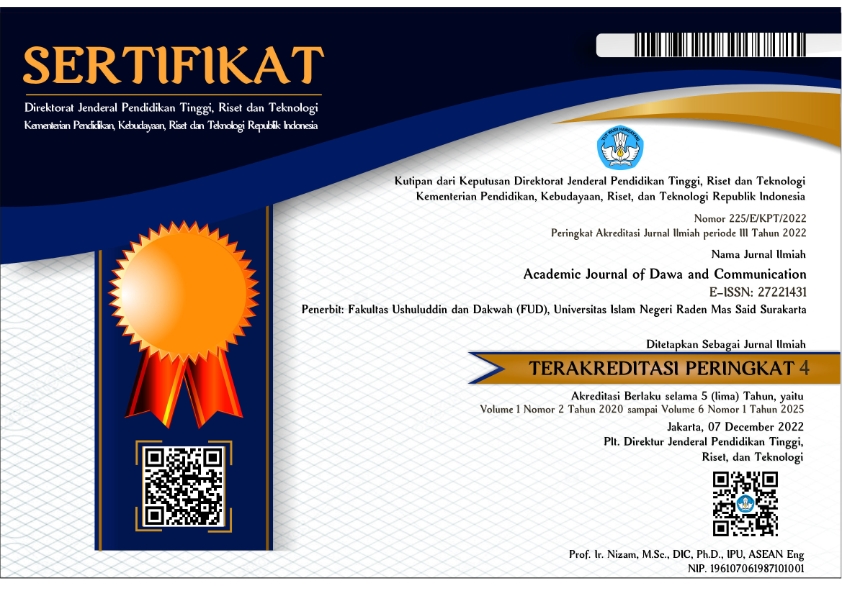Instagram, Pandemi, dan Peran Influencer (Analisis Wacana Kritis pada Postingan Akun Instagram @najwashihab dan @jrxsid)
DOI:
https://doi.org/10.22515/ajdc.v1i2.2722Keywords:
critical discourse, digital literacy, social mediaAbstract
The spread of information relates to Covid-19 on social media increasingly widespread causes the government to use persuasive communication patterns. However, the communication strategies carried out by the government through influencers do not fully receive support. The Instagram accounts of @najwashihab and @jrxsid are interesting to study because they have such a wide influence on the way the public views this pandemic. The construction of discourse developed by their Instagram content was analyzed. This study used critical discourse analysis method of text and documentation as well as content display analysis. It is found that these accounts have a variety of views in understanding the Covid-19 phenomenon. Through textual analysis, social cognition, and social concepts initiated by Teun Van Dijk, these accounts incorporate the cognitive abilities in their posts. The @najwashihab account is much more acceptable than @jrxsid because its argument is in line with the narrative developed by the government. The language style used by @jrxsid shows a critical attitude towards policies that are pro to WHO. However, @jrxsidreceives more provocative comments from the followers than the @najwashihab account. In the same way, these accounts have similarities in their concern for the people affected by Covid-19. Both accounts have creativity in displaying content with an attractive visual style and have social responsibility.
Downloads
References
Cole, R. E. (1998). Learning from the Quality Movement: What Did and Didn’t Happen and Why? SAGE Publishing CQ Library, 41(1), 43–73.
Cushion, C and R. Jones, R. . (2006). Power, Discourse, and Symbolic Violence in Professional Youth Soccer: The Case of Albion Football Club. Sociology of Sport Journal, 23(2), 142–161.
Donald, A., Jacobs, L. C., Razavieh, A., & Sorensen, C. K. (2009). Introduction to Research in Education (8th ed.). Cengage Learning.
Eriyanto. (2009). Analisis Wacana; Pengantar Analisis Teks Media. LKiS.
Fairclough, N., & R. Wodak, (1997). Discourse as Social Interaction. Sage Publication.
Fatimah. (2015). Strategi Pertarungan Simbolik Dalam Rubrik Indonesia Satu Harian Kompas. NOSI, 2(8), 41–51.
Gugus Tugas Percepatan Penanganan Covid-19. (2020). No Title.
Gustam, R. R. (2015). Karakteristik Media Sosial Dalam Membentuk Budaya. Populer Korean Pop di Kalangan Komunitas Samarinda dan Balikpapan. EJournal Ilmu Komunikasi,3(2), 224–242.
Hamad, I. (2004). Konstruksi Realitas Politik dalam Media Massa (Studi Pesan Politik Dalam Media Cetak Pada Masa Pemilu 1999). Makara, 8(1), 21–32.
Hasbul, F. (2020). Aktivisme Sosial Baru Warga. Detik.
Kurniawan, S. (2019). Apa Itu Influencer dan Manfaatnya untuk Bisnis?
Martono, N. (2012). Kekerasan Simbolik di Sekolah; Sebuah Ide Sosiologi Pendidikan Pierre Bourdieu. Raja Grafindo Persada.
Mulyana, D. (2005). Mulyana, Deddy, Ilmu Komunikasi: Suatu Pengantar, Bandung. PT Remaja Rosdakarya.
Nasrullah, Rully, dkk. (2017). Materi Pendukung Literasi Digital. :Kementerian Pendidikan dan Kebudayaan.
Nurhayati. (2016). The Power Struggle in the Testimony of Sudirman Said to the House Ethics Council (MKD). In KOLITA 14 . Unika Atma Jaya.
Phatia, L. (2014). Analisis wacana kritis dalam bahasa media jejaring sosial. UIN Sunan Kalijaga.
Sobur, A. (2009). Analisis Teks Media. PT Remaja Rosdakarya,.
Van Dijk, T. . (2001). Critical Discourse Analysis. In Deborah S, Deborah T, and Heide E.H, The Handbook of Discourse Analysis. Blackwell Publishers Ltd.
Wacquant, L. (2006). Key Contemporary Thinkers. Macmillan.
Watie, E. D. . (2011). Komunikasi dan Media Sosial. Jurnal Ilmu Komunikasi Universitas Semarang.
Suciningsih, Indriya. (2019). Analisis Wacana Kritis Trending Topic Hashtag Crazy Rich Surabayan di Twitter. Skripsi UIN Surbaya.
Portal/WEB
https://www.who.int/emergencies/diseases/novel-coronavirus-2019
Downloads
Published
How to Cite
Issue
Section
Citation Check
License
Copyright (c) 2020 Academic Journal of Da'wa and Communication

This work is licensed under a Creative Commons Attribution-NonCommercial 4.0 International License.





















